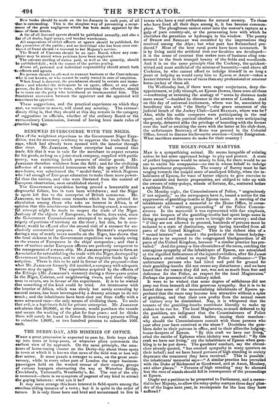THE ROLEY-POLEY MARTYRS.
MAN is a sympathizing animal. He seems incapable of existing unless he has some oppressed beings to pity and protect. A state of perfect happiness would be misery to him, for there would be am one to excite his compassion—no one in whose behalf to indulge his quarrelsome propensities. The county of Surrey must be fast verging towards the insipid state of unalloyed felicity, when the in- habitants of Epsom, for want of better objects to give exercise to their amiable and heroic propensities, are obliged to take up with the owners of roley-poleys, wheels of fortune, &c., scattered before a ruthless Police.
On Monday night, the Commissioners of' Police' "ungraciously if not unjustly," as the newspapers have it, issued a notice for the suppression of gambling-booths at Epsom races. A meeting of the inhabitants addressed a memorial to the Home Office, in conse- quence of this "arbitrary proceeding" of the Police Commis- sioners. In the memorial it was represented with due emphasis, that the keepers of the gambling-booths had spent large sumsin hiring ground and fitting up tents to inveigle the unwary ; and that "if they are not allowed to proceed, hundreds of persons must be reduced to a state of destitution, many having travelled from all parts of the United Kingdom." This is the richest idea of.a "vested interest" on record : the pockets of the honest holyday- folks are to be exposed to the congregated blackguardism of all parts of the United Kingdom, because "a similar practice has pre- vailed." And the penny-a-line chroniclers of the races, catching the contagious sympathy of the inhabitants of Epsom, are astonished at the dignified forbearance of the injured swindlers, after Sir JAMES Gaamma's cruel refusal to repeal the Police ordinance—" The unfortunate persons who had hired and paid for ground for their gambling-booths did not create any disturbance ; and we have heard that the reason they did not, was not so much from fear and deference for the Police, as respect for the local Magistrates." Perhaps the presence of the military aided. It were to be wished that some degree of selfishness did not peep out from beneath all this generous sympathy. But it is to be feared that some of the memorializing inhabitants of Epsom ap- prehend that the races may become less attractive without a spice of gambling, and that their own profits from the annual resort of visiters may be diminished. Nay, it is whispered that the tenants of the gambling-booths contribute liberally to make up stakes to be run for. The local Magistrates, so much deferred to.by the gamblers, are indignant that the Commissioners of Police did not consult with them before issuing their mandate : why should the Commissioners consult with those persons who year after year have connived at the abuse ? Doubtless the gam- blers defer to their patrons in office, and to their allies the lodging- house-keepers of Epsom. "By this craft we have our living," cried the smiths of Ephesus when idolatry was assailed: "By this craft we have our living," cry the inhabitants of Epsom when gam- bling is to be put down. The gamblers' conduct, say the chroni- clers already quoted, "has created sympathy in many quarters on their behalf; and we have heard persons of high standing in society
deprecate the treatment they have received. This is possible : the inhabitants' memorial says—"A similar practice has prevailed with the Duke of Richmond at Goodwood, and at Ascot, Moulsey, and other places." "Persons of high standing" may be alarmed lest the rent of stands should fall in consequence of the proceedings at Epsom.
Ought not a petition to be presented to Parliament, and a memo- rial to her Majesty, to allow the roley-poley martyrs three days' plun- der of the lieges next year, in recompense for the loss they hate suffered ?


























 Previous page
Previous page